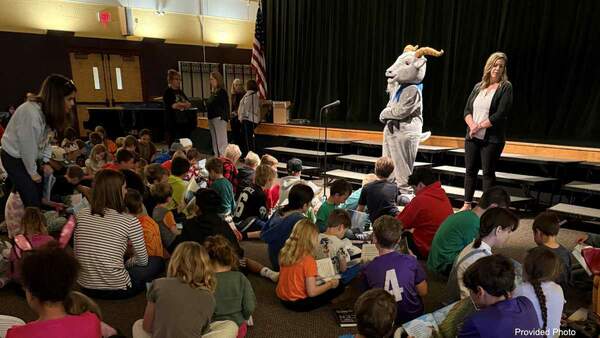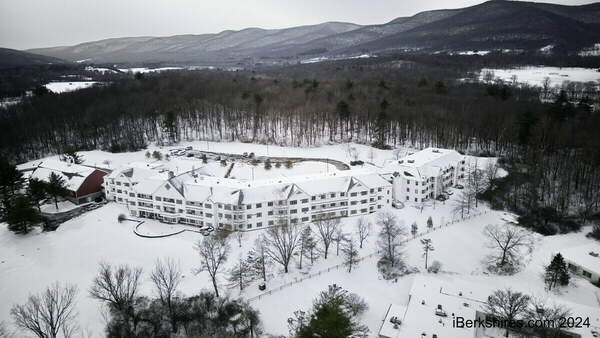
Mount Greylock School Committee Member Charges Open Meeting Violation
WILLIAMSTOWN, Mass. — A member of the Mount Greylock Regional School Committee on Tuesday lodged an Open Meeting Law complaint against the committee's chairwoman and the chairs of the two elementary school committees that comprise the Williamstown-Lanesborough Tri-District.
Richard Cohen alleges that Carolyn Greene, along with Williamstown School Committee Chairman Dan Caplinger and Lanesborough School Committee Chairwoman Regina DiLego have been deliberating and taking action in secret meetings in violation of state law.
Among other things, Cohen's complaint alleges that the trio usurped the authority of an established Tri-District subcommittee, but a careful reading of the Tri-District's policy makes it unclear whether his complaint accurately characterizes the subcommittee's role.
The complaint stems from a March decision by Tri-District Superintendent Douglas Dias to submit an application to serve as the part-time superintendent of the Shaker Mountain School Union 70.
The application was submitted on March 7, and the Mount Greylock School Committee was notified of the move on March 15 in an executive session.
On Tuesday, Greene acknowledged that the matter was not an appropriate topic for an executive session and apologized for raising it there.
But Cohen's complaint makes only passing reference to the fact that the item was not among the stated purposes for the full committee's executive session. Rather it focuses on what he alleges to be the illegal deliberations of what he calls the "Chairs Committee."
He cites a series of emails on March 4, beginning with one from Dias to the three school committee chairs informing them he might apply for the Shaker Mountain post. According to Cohen's complaint, within 90 minutes, all three chairs replied to Dias that they were OK with the idea. In Cohen's words, this constituted a "vote."
Cohen's complaint notes that the Tri-District has two committees designated to facilitate the shared services agreement among the three school district: Superintendency Union 71, a joint venture of Williamstown's and Lanesborough's elementary schools, and the Administrative Review Subcommittee.
The second part of his complaint deals with the latter, alleging that the three committee chairs, his "Chairs Committee," on May 13 "continued to take collective actions in secret." This time, the issue was the evaluation process for Dias, a process that is handled independently and concurrently by SU71 and the Mount Greylock Regional School Committee, the two hiring authorities.
"Note that ARS [the Administrative Review Subcommittee] has jurisdiction over the process of evaluating superintendent [sic], but the fourth member of ARS was not made aware that the CC [Chairs Committee] was meeting," the complaint reads.
When asked after Tuesday's four-hour School Committee meeting about the fact that the Tri-District website explains ARS' purpose as existing "for purposes relating to hiring shared administrative personnel," Cohen reiterated the claim that ARS has a role in evaluating the superintendent.
"I'm not making this up," he said, and he suggested that the questioner look at the SU71 agreement on the district's website.
Early Wednesday morning, Cohen emailed a screenshot taken from the website with the words "evaluation procedure" underlined in red for emphasis.
However, a full reading of the clause he cites paints a different picture.
"The subcommittee shall be responsible for the initial development of a Superintendent contract, job descriptions, and evaluation procedure, then to be brought to the [Mount Greylock] 'Committee' and the [Superintendency] ‘Union' for approval. The subcommittee is also responsible for the initial review of other shared contracted services, administrative contracts, job descriptions and evaluation procedures, as developed by the Superintendent of Schools, then to be brought to the 'Committee' and the 'Union' for approval."
The full agreement can be found here.
The use of the word "initial" twice in the paragraph in question appears to confirm the website's depiction of ARS' role in facilitating the transition between superintendents. After that, the elected school committees — jointly in the case of SU71 — have jurisdiction.
In his complaint, Cohen notes that the three school committee chairs are ex officio members of the ARS, but afterward, he said that he was not alleging ARS (which requires all four members for a quorum) met in violation of the Open Meeting Law. Rather, he is asserting that the three chairs are "assuming too much power outside the Open Meeting Law process."
District counsel Fred Dupere attended Tuesday's meeting and challenged Cohen's characterization of the three chairs as a "committee."
"To create a public body, it has to be formed," Dupere said. "The fact that three people who are influential get together and talk about public issues doesn't make that a public body."
Cohen countered that the three chairs "serve a public purpose" and "took collective action," which made them a de facto public body. At that point he told Dupere and the rest of the School Committee that he had a draft of the OML complaint prepared.
Cohen asked Dupere to consult with the attorney general's office about the specifics of the complaint.
"I have a call in to the AGO," Dupere said. "If you have a concern about whether I have the facts right, you can send me your question about the facts so I can have a fuller discussion with the attorney general."
Cohen insisted that Dupere fax the draft complaint to Boston before consulting with the AGO, but Dupere declined because the complaint was not official.
"I am now filing this Open Meeting Law complaint officially," Cohen replied, handing the complaint to Greene.
Committee member Steven Miller asked Cohen if he would withdraw his complaint if the committee on Tuesday could reach an agreement about how to go forward.
"I understand what happened looks bad, and it was an improper use of the executive session, but I'm trying to see if we can have a constructive conversation," Miller said.
At that point, Cohen was committed to following the OML process.
"It's imperative that the attorney general, if it goes to the attorney general, has a full understanding of what happened," Cohen said.
At that point, Greene attempted to move on, facing a full agenda and knowing that the committee would need to meet again within 10 days to formally reply to the complaint, per state law. That led to a testy exchange between Cohen and the chairwoman.
"I think this conversation is done," Greene said.
"That's part of the problem," Cohen said.
"Rich, you have talked for 80 percent of this meeting," Greene said as the session stretched into its second hour.
"I think the conversation on this particular topic has been shut down early," Cohen said.
"You have already told us we are not following the process … so this conversation ended when you filed the Open Meeting Law complaint," Greene said.
Open Meeting Law Complaint Chairs Committee by iBerkshires.com
Tags: MGRHS, open meeting complaint,















